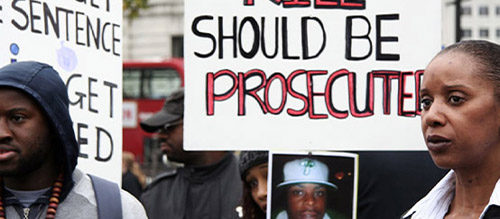Ultraviolence (2020) BFI LFF Review
Ultraviolence (2020)
Director: Ken Fero
Screenwriter: Tariq Mehmood
Ultraviolence is a powerful documentary highlighting the injustices of deaths that happened in police custody between the years 1995 and 2005, a film that takes an in-depth look at the racial brutality that is seen year after year within the British Police. Told through interview footage from the friends and families of the victims, alongside graphic CCTV footage from inside the police stations where these brutal murders took place, and reenactments presented through animation in the cases where video footage does not exist, Ultraviolence provides a much needed insight into police brutality in a year where it couldn’t be more relevant. Throughout the piece we follow the lives of the families of victims as they fight for justice for their loved ones, each of whom succumbed to the hand of a faulty system.
Nineteen years after director Ken Fero released his groundbreaking documentary film Injustice (2001), which similarly chronicled the struggle against police brutality, Ultraviolence has provided a follow-up that feels more relevant now than ever. 2020 has seen numerous accounts of police brutality take centre stage in worldwide news coverage, specifically regarding cases from the United States, leading to mass media coverage of the Black Lives Matter marches that originated due to the unlawful killing of George Floyd on May 25th in Minneapolis, Minnesota. These demonstrations spread worldwide, including London where most of the deaths that are highlighted in Ultraviolence took place.
Here, family members of the fallen relive the exact moments they heard the news of the deaths of their loved ones in emotional recounts of the days that changed their lives forever. In these intimate interviews we hear stories of how the deaths of their brothers, fathers, sons encouraged them to hold presentations, vigils and rallies to educate the nation in the endless brutality that takes place within local police stations. Cathy Tyson’s powerful and emotional narration of the film aids these stories, gifting further gravitas to an already powerful message.
The film’s apparent low budget is clear but seems somewhat irrelevant to the quality of the film given the strength of the message at its heart; it’s tough to focus on the quality of production when you’re hearing a heart-wrenching story of a loved one’s last few moments on earth. And Ultraviolence does manage to imbue its message with a sense of righteous anger, elevating the already deeply moving tales of the families involved and providing some explosive CCTV footage that drives home the utterly deplorable actions of those responsible. In some cases, you’re guaranteed to curl with fury at the injustices that are taking place before your eyes; injustices do not take place in some far away distant past, but in our contemporary space, and very much close to home.
The original theme of the documentary was not supposed to be about race, the idea behind the film instead being to spotlight the faults of the police system and bring attention to how the police men responsible were never prosecuted, how the CPS (Crown Prosecution Service) did nothing to bring justice for these families. But, in 2020, and with our collective lens firmly focused on race relations, it’s impossible to watch Ultraviolence and not be aware of the racial divide that is so blatant from the opening scene and so indicative of the culture in which we live.
A powerful telling of the events of the late 90s/early 00s that is both poignant and brutal, Ultraviolence lives up to its title, overcoming a slight pacing issue in its second act to bring the reality of these events to life with footage that is bound to stay with you for a long time after seeing this important film.
12/24


